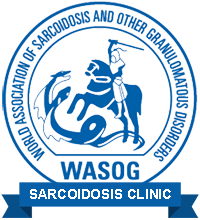Alterations in the membrane-associated proteome fraction of alveolar macrophages in sarcoidosis
Keywords:
Alveolar macrophages, proteomics, sarcoidosis, membrane-associated proteinsAbstract
Background: Alveolar macrophages are implicated in the pathogenesis of lung sarcoidosis. Their interaction with T-cells leads to an inflammatory response that may either resolve within 2 years, or become chronic with an increased risk to develop lung fibrosis.
Objective: To perform quantitative profiling of the membrane-associated proteome of alveolar macrophages in sarcoidosis patients and healthy individuals to identify specific proteins and pathways involved in sarcoidosis pathology.
Methods: Differential proteomic analysis was performed on iTRAQ (isobaric Tag for Relative and Absolute Quantitation) labeled samples using tandem mass spectrometry. Subsequently, uni- and multivariate statistical analyses and pathway- and network analyses were performed.
Results: Eighty proteins were differentially expressed between healthy and sarcoidosis patients. Down-stream pathway analysis confirmed our recent reports of up-regulation of two phagocytotic pathways: Fcγ receptor-mediated phagocytosis and clathrin-mediated endocytosis signaling. An additional pathway, pyruvate metabolism, was found to be up-regulated in sarcoidosis patients. The oxidative phosphorylation pathway was differentially expressed in subgroups of sarcoidosis, with up-regulation in Löfgren’s patients and down-regulation in non-Löfgren’s patients.
Conclusion: This unprecedented proteome profiling of the membrane-associated fraction of alveolar macrophages confirmed previous findings of alterations in phagocytotic pathways due to sarcoidosis, as well as indicated a differential dysregulation of the oxidative phosphorylation pathway related to disease outcome in sarcoidosis.Downloads
Published
Issue
Section
License
This is an Open Access article distributed under the terms of the Creative Commons Attribution License (https://creativecommons.org/licenses/by-nc/4.0) which permits unrestricted use, distribution, and reproduction in any medium, provided the original work is properly cited.
Transfer of Copyright and Permission to Reproduce Parts of Published Papers.
Authors retain the copyright for their published work. No formal permission will be required to reproduce parts (tables or illustrations) of published papers, provided the source is quoted appropriately and reproduction has no commercial intent. Reproductions with commercial intent will require written permission and payment of royalties.

This work is licensed under a Creative Commons Attribution-NonCommercial 4.0 International License.




